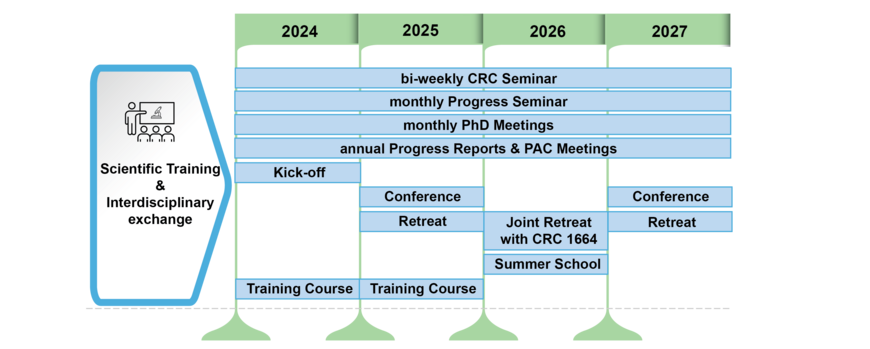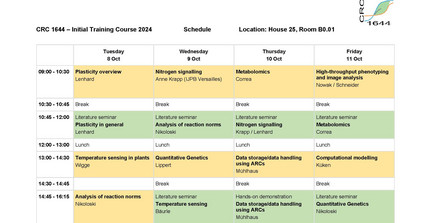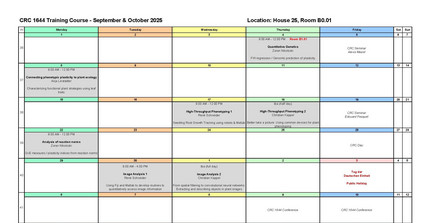Early Career Researchers Programme
Our CRC is dedicated to fostering the development of early-career researchers (ECR) and supporting diverse career trajectories, both within and outside academia. CRC initiatives include transparent supervision agreements, structured PhD advisory committees and annual progress and career planning meetings. Scientific and personal training form an integral part of the programme.
We have developed a comprehensive curriculum covering all CRC core activities, professional skills, science communication and personal development that include mandatory and optional activities, workshops and events over the doctoral period. Ongoing activities include regular progress presentations, focus group meetings and seminars featuring external experts, which foster interdisciplinary expertise. The CRC supports networking and career development through events such as the annual retreat, international conferences and a dedicated PhD summer school. Students are encouraged to undertake research stays to enhance their technical skills, and financial support is available for this. Career development is strengthened through courses in presentation and leadership skills.
The coordination of these training activities is managed by the CRC’s coordinator. PhD students are enrolled in PoGS at UP and HGS at HU Berlin, which offer bilingual courses that prepare researchers for careers in academia, industry or public administration.
Furthermore, involving undergraduate students in CRC projects as assistants gives them early career exposure to advanced research. These comprehensive support systems ensure that early career researchers are equipped with the necessary skills, knowledge and networking opportunities to thrive in academia and beyond.
All structures and processes are summarised in the dedicated guidelines for PhD students and postdocs.
These guidelines clarify expectations, opportunities and support structures, and serve as a reliable reference throughout the entire doctoral or postdoctoral journey within CRC 1644.
Curriculum
The curriculum covers a variety of activities of diffent formats, such as seminars, workshops, and group meetings, across different modules.
- Thesis supervision
- Research Excellence
- Personal and career development
- Scientific Networking & Exchange
- Public outreach and science communication
- Responsibility and active engagement
Students have to achieve a minimum of 30 credit points (CP) throughout their PhD programme.
It is also mandatory, however, to complete at least three courses on professional or transferable skills offered by the PoGS.
Curriculum
Supervision & Quality Management
All PhD students will comply with the doctoral regulations of their respective faculties at the University of Potsdam, Humboldt University of Berlin, or the University of Cologne.
Individual PhD students are supervised by their respective PIs through regular meetings and internal group progress reports.
PhD Advisory Committee (PAC)
High‑quality research and successful graduation require transparent structures and active mentoring. To ensure this, each student will choose a three‑person PhD Advisory Committee (PAC), consisting of two members from within the CRC and one external member from outside the CRC.
Each student will write an annual progress report, which is shared with the PAC and the coordinator. These reports are discussed in annual PAC meetings to ensure efficient progress monitoring, provide structured feedback, and support the student’s well‑being. A short written protocol documents the outcomes of each meeting.
The PAC meeting in year 3 places special emphasis on strategies to successfully complete the PhD, achieve high‑impact publications, and discuss career plans, thereby providing valuable guidance for the final phase of the doctoral project.
In addition, each PhD student will present their research in annual progress talks during the monthly CRC Day, receiving feedback on both their scientific work and presentation skills within the CRC community.
Research Excellence
Research in SFB 1644 spans genetics, cell and developmental biology, physiology, evolutionary biology, ecology, computational biology and mathematical modeling. To succeed in this interdisciplinary setting, early career researchers are encouraged to gain insight into the diverse methods and concepts represented in the consortium. The Graduate Programme supports this through:
- monthly CRC Days with Progress Talks by PhD Students and Postdocs
- bi-weekly CRC Seminars with invited guest speakers
- bi-monthly PhD student meetings
- bi-annually International Conferences
- annual Retreats
- Summer Schools
- Training courses on relevant scientific topics and methods
Personal Development
The Graduate Programme also promotes the development of skills that are crucial for a successful scientific career. Doctoral students and postdocs are encouraged to participate in courses on:
- Professional Skills such as Scientific Writing and presentation, Data Management, Publishing etc.
- Transferable Skills such as Time Management, Giving & Receiving Feedback, Self presentation etc.
- Career planning
These courses are either part of the UP Course Programme, provided by the PoGS, or organised by our coordinator.
All CRC 1644 PhD Students and Postdocs participated in a Workshop on Good Scientific Practice and Research Integrity!
Scientific Networking and Exchange
An essential part of the Graduate Programme is the opportunity to build professional networks and exchange ideas with peers and senior scientists. We actively support scientific networking through:
- Meet‑the‑Speaker Lunches with invited seminar speakers,
- Participation in the IBB Science Day and other faculty events,
- Regular PhD meetings within the CRC community,
- Attendance and active participation in national and international conferences.
These activities provide a platform to discuss research, foster collaborations, and establish connections that will benefit future career development.
Public outreach and science communication
Our CRC also encourages its members to engage with the public and share their passion for research beyond the academic setting. PhD students and postdocs are invited to:
- Actively contribute to and help organize the Potsdam Science Day
- Participate in other outreach activities,
- Present their research in accessible formats to spark curiosity and foster dialogue with society
These experiences strengthen communication skills, increase visibility for the CRC’s research, and demonstrate the societal relevance of plant science.
Responsibility and active engagement
Early career researchers in CRC 1644 are not only participants but also active contributors to the scientific community. PhD students and postdocs are encouraged to take on responsibility by:
- Serving as Early Career Researcher (ECR) representatives within the Steering Committee and PhD Student Representatives
- Contributing to the organization of retreats, summer schools, and conferences
- Shaping the Graduate Programme by bringing in new ideas and initiatives
Through these activities, they gain valuable leadership and organizational skills and help create a dynamic, inclusive environment for all members.



